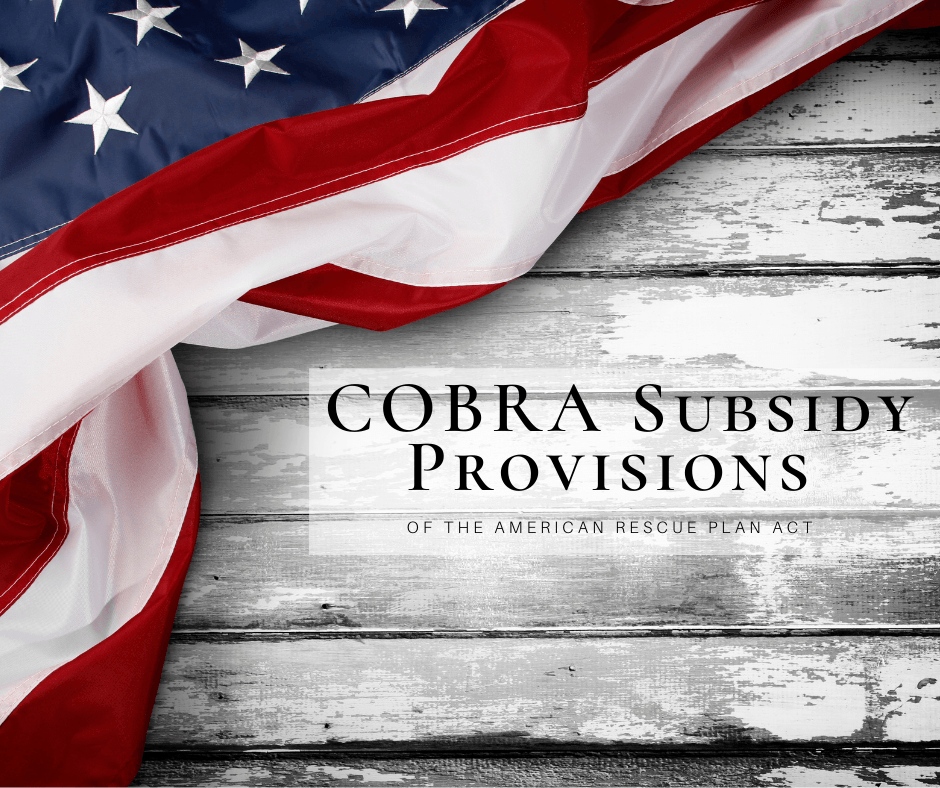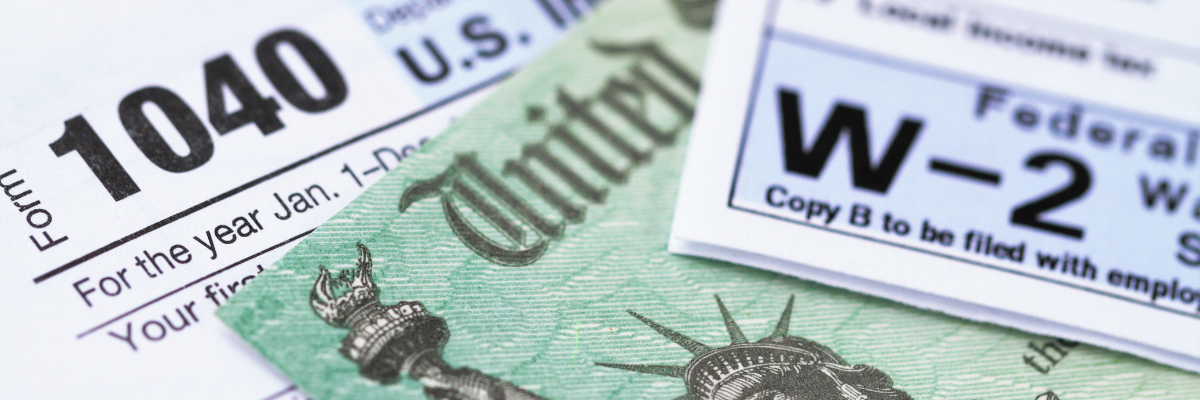
Highlights
Eligible Individuals
The subsidy is generally available to people who elected COBRA, become eligible for COBRA, or declined or discontinued COBRA and are still within their original COBRA coverage period.
Funding
The subsidy is funded by a refundable, advanceable credit against payroll taxes taken by employers or carriers.
Option to Switch Coverage
The ARPA allows covered individuals to switch to similarly priced health coverage, if the employer allows it.
Important Dates
April 1, 2021
ARPA 100% subsidy begins to cover COBRA premiums.
Sept. 30, 2021
ARPA subsidy provision for COBRA premiums expires.
The American Rescue Plan Act (ARPA), signed into law March 11, 2021, provides a 100% subsidy of premiums for employer-sponsored group health insurance continued under the Consolidated Omnibus Budget Reconciliation Act of 1986 (COBRA) and similar state continuation of coverage (mini-COBRA) programs.
ARPA subsidies cover the full cost of COBRA or mini-COBRA premiums from April 1, 2021, through Sept. 30, 2021, for employees (and their qualifying family members), if the employee lost or loses group health insurance due to an involuntary job loss or reduction in work hours. The subsidy applies to people who are still within their original COBRA or mini-COBRA coverage period, for the length of that coverage period, even if they declined or dropped COBRA or mini-COBRA coverage earlier.
The subsidy does not apply to:
- Individuals whose job loss was voluntary or the result of gross misconduct; or
- Individuals who are eligible for another group health plan or Medicare.
The subsidies are funded through a payroll tax credit. Employers are required to provide new notices about the subsidy to employees. The U.S. Department of Labor (DOL) will issue model notices for this purpose.
Action Steps
Employers should familiarize themselves with the provisions of the ARPA and watch for agency guidance on its implementation.
Overview
COBRA requires group health plans to allow covered employees and their dependents to continue their group health plan coverage when it would be lost due to specific events, such as a termination of employment or reduction in working hours. Individuals are usually allowed to continue their COBRA coverage for 18 months, although some similar state mini-COBRA laws mandate a longer coverage period.
Under COBRA, group health plans may require those covered to pay 102% of the premium for their continuing health insurance, leading many eligible individuals to decline coverage. The ARPA subsidy covers the full cost of COBRA or mini-COBRA premiums from April 1 - Sept. 30, 2021, for “assistance-eligible individuals.”
Covered Plans
The COBRA subsidy in the ARPA applies to group health plans subject to federal COBRA or to a state mini-COBRA program. Plans subject to federal COBRA are plans maintained by employers with 20 or more employees on more than 50% of the business days in the previous calendar year. Small-employer plans, small governmental plans and church plans are not subject to federal COBRA, but may be subject to a state mini-COBRA law and therefore be covered by the ARPA’s COBRA subsidy provisions.
Health flexible spending arrangements under Section 125 cafeteria plans are not covered by the ARPA COBRA subsidy.
Eligible Individuals
Individuals are eligible for the COBRA subsidy if they:
- Are a qualified beneficiary of the group health plan; and
- Are eligible for COBRA or mini-COBRA continuation coverage because of the covered employee’s involuntary termination (unrelated to gross misconduct) or reduction in hours of employment.
The subsidy is not available for people who voluntarily left their job. It is also unavailable for people who are eligible for Medicare or another group health plan, not including:
- A plan covering only excepted benefits;
- A qualified small employer health reimbursement arrangement; or
- A flexible spending arrangement.
Furthermore, individuals receiving a COBRA subsidy who become eligible for a group health plan or Medicare must inform the health plan for which they are receiving the subsidy of that fact, or face a penalty. The premium subsidy is not counted as gross income.
Extended Election Period
The ARPA allows individuals to elect subsidized COBRA if they:
- Become eligible for COBRA or mini-COBRA due to involuntary job termination (not caused by gross misconduct) or reduction in hours between April 1 and Sept. 30, 2021;
- Previously declined COBRA or mini-COBRA after becoming eligible due to involuntary job termination (not caused by gross misconduct) or reduction in hours, but would still be within their COBRA or mini-COBRA coverage period had they elected the coverage at that point; or
- Previously elected COBRA or mini-COBRA but discontinued the coverage before April 1, 2021.
The election period for subsidized COBRA under ARPA begins on April 1, 2021, and runs until 60 days after the date individuals receive notice from the health plan of the availability of the COBRA subsidy.
Duration of Coverage
COBRA and mini-COBRA coverage under the ARPA election extension starts with the first period of coverage beginning on or after April 1, 2021, and continues through the end of the individual’s COBRA or mini-COBRA coverage period. The individual’s COBRA or mini-COBRA coverage period is the period that would have applied had the individual elected the continuation coverage when first eligible following the initial qualifying event. For individuals who previously elected COBRA or mini-COBRA, discontinued it, and are now using the ARPA extended election period to obtain COBRA, the COBRA coverage period is calculated as if they had not dropped the coverage.
Switching Coverage
The ARPA contains a provision that—at the employer’s option—allows individuals eligible for the COBRA subsidy and enrolled in the employer’s group health plan to change to different health coverage also offered by the employer. The new coverage cannot have a higher premium than the individual’s previous coverage, and it must be offered to similarly situated active employees. The option does not apply to plans that provide only excepted benefits, to qualified small employer health reimbursement arrangements or to health flexible spending arrangements.
The change must be elected within 90 days of the employee receiving notice of the option.
Notice Requirements
The ARPA imposes new COBRA notice requirements on health plans.
General Notice
Plan administrators must provide notification of COBRA benefits under ARPA. The notice must be written in clear and understandable language, and it must inform recipients of the availability of ARPA premium assistance and the option under the ARPA to enroll in different coverage (if the employer permits the option).
The notice must be provided to individuals who become eligible for COBRA or mini-COBRA during the period of April 1 - Sept. 30, 2021. In addition, it must be provided by May 31, 2021, to people who have already elected COBRA coverage, and to people subject to the ARPA election extension—that is, people eligible for the subsidy who declined or discontinued COBRA or mini-COBRA before April 1, 2021.
The notification may be included in an amendment to a plan’s existing notices or be given in a separate notice, but it must contain the following information:
- The forms necessary for establishing eligibility for premium assistance
- The name, address and telephone number necessary to contact the plan administrator and any other person maintaining relevant information in connection with premium assistance
- A description of the extended election period under the ARPA
- A description of the obligation of qualified beneficiaries to notify the plan if they become eligible for another group health plan or Medicare, and the penalty for failure to do so
- A prominently displayed description of the right to a subsidized premium and any conditions on entitlement to the subsidized premium
- A description of the option of the right to enroll in different coverage (if the employer permits this option)
The DOL is charged with issuing a model general notice by April 10, 2021, for plans to use to meet the general notice requirement.
Notice of Expiration of Subsidy
Plans must also provide individuals eligible for the ARPA subsidy with notice of its expiration. The notice must be written in clear and understandable language, and inform recipients that:
- The premium assistance will expire soon, prominently identifying the expiration date; and
- The individual may be eligible for coverage without premium assistance through COBRA continuation or a group health plan.
Plans are not required to issue an expiration notice to individuals whose subsidy is expiring because they became eligible for other group health plan coverage or Medicare.
The notice must be provided during the 45 - 15-day period before the individual’s subsidy expires. The DOL must issue model expiration notices by April 25, 2021.
Tax Credit
The ARPA COBRA subsidy is funded through a tax credit to employers whose plans are subject to COBRA or are self-insured, to the plan for multiemployer plans, and to the insurer for other plans. The credit is taken against payroll taxes. It can be advanced (according to forms and instructions to be provided by federal agencies) and is fully refundable. The credits will be provided each quarter in an amount equal to the premiums not paid by assistance-eligible individuals.
Sign up for our newsletter.




